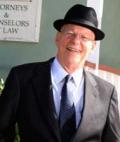Rauchberg, now a senior partner with Proskauer Rose, LLP, said even during law school at Fordham, he wasn't sure which area of law he would specialize in, but knew as soon as he started trying cases that he had chosen the right direction.
"Law school wasn't so much of a commitment as it was something to do while figuring out what I wanted to do. I didn't know I would like it as much as I did," he said. "When I went to work and started working on litigation, I knew through pure dumb luck that I was doing what was right for me."
Rauchberg went to work for Proskauer after his second year of law school and has stuck with the firm since, handling a dizzying array of complex commercial litigation. In his sleek, bright office high above Times Square in New York, Rauchberg talked about some of his more famous cases, including the First Amendment Son of Sam law case he successfully argued before the Supreme Court.
New York's Son of Sam law was intended to prevent criminals from profiting from their crimes by selling their stories. The law required that an accused or convicted criminal's income from works describing his crime be deposited in an escrow account. The money would then be given to the victims of the crime or the criminal's creditors.
The law was named for a serial killer known as the Son of Sam who terrorized New York in the summer of 1977. The state enacted the law so the killer could not profit from selling the rights to his sensational story. Rauchberg handled the favorable challenge to the law on First Amendment grounds in Simon & Schuster, Inc. v. New York Crime Victims Board (1991).
"It was my first and only Supreme Court case," he said. "It was great having a feeling that I was a part of our First Amendment jurisdiction. I would love to do it again if I could find the opportunity. But I'm in private practice, and the clients come first. I'm not searching for Supreme Court opportunities."
Rauchberg told clients that the best advice he gives to new attorneys is to always remember the client comes first. That philosophy has helped Rauchberg attract and maintain some big clients, including Alcatel U.S.A., the Association of American Publishers, Autodesk, Biovail, Citibank, Ernst & Young, MBIA, MetLife, the National Basketball Association, The Rockefeller Group, Sony Pictures, Viacom, and Wells Fargo.
"Always be faithful to the principle that this is about the clients and keep the clients at the forefront of your consciousness and do what they require and remember they deserve everything you're able to do for them within the limits of ethics and law, of course," he said. "And if you do that, then the personally satisfying parts will follow. It's personally satisfying to serve your clients."
Rauchberg said the long hours and heavy workload in litigation are parts of the process; and if new attorneys dislike it now, they probably won't learn to love litigation.
"I joke with younger lawyers sometimes and say, 'If you really kill yourself and give all your intelligence and energy to bear and succeed, the reward is you get to do it again,'" he said. "And I believe that. I think to get interesting cases—and at this stage in my career, to get to be running the interesting cases is a wonderful way to spend the day."
Rauchberg, who grew up in the Bronx and is a proud product of the New York public school system, said one of the great challenges of complex commercial litigation is to make cases interesting for juries. He said he studies people in courtrooms to gauge their reactions and that the role of any good trial lawyer is to be a good storyteller, to tell the facts in a compelling and straightforward way.
"There aren't a lot of antics in the kinds of commercial cases I handle. It is important to make presentations that are interesting," he said. "A lot of the stuff that the people who are litigating the case think is so interesting and crucial—other people think [it] is boring."
Rauchberg often represents film and studio clients in Hollywood and says the work has an additional bonus of allowing him to spend time in Los Angeles, where his son and grandchild live. He also represented Bob Woodward and Simon & Schuster in the successful defense of libel litigation growing out of Wired, Woodward's biography of John Belushi.
Rauchberg, a Fellow of the American College of Trial Lawyers, spent four years as chair of Proskauer's 200-lawyer Litigation and Dispute Resolution Department and has served as a member of the firm's Executive Committee.
While Rauchberg may not have known where his career would go during law school, he was not a passive student and was Editor-in-Chief of the Fordham Law Review before graduating in 1967.
He said he never really considered leaving Proskauer Rose for other opportunities. If you find a place that makes you happy, he said, don't leave.
"This is wonderful place to practice law," he said. "Litigating is very satisfying, and what a person interested in litigating needs is an environment that doesn't get in the way. There are places, I suppose, where politics and internal discord among the partners or whatever can be distracting. But there are no problems of that kind in here, and you can just have a good time, represent your clients, and do what litigators like to do."




